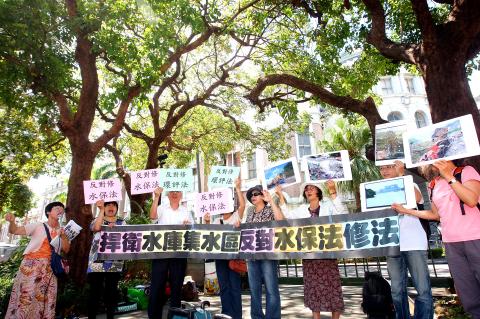Several environmental organizations yesterday filed a petition with the Control Yuan, asking it to investigate the Soil and Water Conservation Bureau’s proposal to amend the Soil and Water Conservation Act (水土保持法), which would loosen the restrictions on development in reservoirs’ catchment areas.
Before submitting their appeal, the representatives from 40 civic groups held up photos of mudslide disasters and rivers filled with mud, and shouted slogans.
The act was passed in 1994, stipulating that all development activities are prohibited in designated special soil and water conservation areas within reservoir catchment areas.

Photo: CNA
The proposed amendment would reduce the development prohibited areas to areas that “need special conservation,” restricting the prohibited development activities from all types to only four, and granting local governments the authority to alter designated special soil and water conservation areas.
Groups fear the proposed amendment would put nearly all reservoir catchment areas at risk of pollution.
According to the Soil and Water Conservation Bureau’s statistics, there are more than 100 reservoirs in the country and the combined size of reservoir catchment areas is about 2.05 million hectares, accounting for about 78 percent of the nation’s mountainous areas.
If the amendment is passed, about 1.72 million hectares of reservoir catchment area would no longer be under the strict protection of being designated as soil and water conservation areas, the groups said.
Taiwan Water Conservation Alliance spokesperson Chen Jiau-hua (陳椒華) said the proposed amendment will likely turn most of the reservoir catchment areas into ordinary hillside land, and development activities in these areas may threaten water quality and land safety.
Hsu Chan-shuan (徐嬋娟), who leads the Flood Management Watch, said that following a typhoon in 2006 that brought large amounts of mud into the Shihmen Reservoir (石門水庫) and caused residents in Taoyuan to be left without clean water for a number of days, lawmakers at the time swiftly passed budgets of NT$25 billion (US$832 million) for the Shihmen Reservoir and NT$116 billion for other easily flooded areas to improve water and soil conservation.
“However, if this amendment is passed these reservoirs will see further development activities and the government will have to spend even more money to make up for the disasters caused by them,” she said.
“The government should amend laws to protect the public, but the proposed amendment is in fact loosening laws,” Green Party Taiwan member Wang Chung-ming (王鐘銘) said. “Basic needs, such as water and food, should not be sacrificed for economic benefits from development activities… and the government should not have to spend more money to make up for the destruction caused by disasters.”
Opening up areas for development means more trees will be cut down, resulting in landslides after heavy rain, Taiwan Tree Protection Alliance convener Chang An-chi (張安琪) said.
“The government needs to ensure people’s right to life. We want to drink clean water, not waste water,” she said, adding that companies that benefit from the development activities are unlikely to maintain a healthy balance between protecting the environment and maximizing their economic benefits, “while the public will have to endure the consequences of polluted water and a damaged environment.”

The manufacture of the remaining 28 M1A2T Abrams tanks Taiwan purchased from the US has recently been completed, and they are expected to be delivered within the next one to two months, a source said yesterday. The Ministry of National Defense is arranging cargo ships to transport the tanks to Taiwan as soon as possible, said the source, who is familiar with the matter. The estimated arrival time ranges from late this month to early next month, the source said. The 28 Abrams tanks make up the third and final batch of a total of 108 tanks, valued at about NT$40.5 billion

Two Taiwanese prosecutors were questioned by Chinese security personnel at their hotel during a trip to China’s Henan Province this month, the Mainland Affairs Council (MAC) said yesterday. The officers had personal information on the prosecutors, including “when they were assigned to their posts, their work locations and job titles,” MAC Deputy Minister and spokesman Liang Wen-chieh (梁文傑) said. On top of asking about their agencies and positions, the officers also questioned the prosecutors about the Cross-Strait Joint Crime-Fighting and Judicial Mutual Assistance Agreement, a pact that serves as the framework for Taiwan-China cooperation on combating crime and providing judicial assistance, Liang

A group from the Taiwanese Designers in Australia association yesterday represented Taiwan at the Midsumma Pride March in Melbourne. The march, held in the St. Kilda suburb, is the city’s largest LGBTQIA+ parade and the flagship event of the annual Midsumma Festival. It attracted more than 45,000 spectators who supported the 400 groups and 10,000 marchers that participated this year, the association said. Taiwanese Designers said they organized a team to march for Taiwan this year, joining politicians, government agencies, professionals and community organizations in showing support for LGBTQIA+ people and diverse communities. As the first country in Asia to legalize same-sex

MOTIVES QUESTIONED The PLA considers Xi’s policies toward Taiwan to be driven by personal considerations rather than military assessment, the Epoch Times reports Chinese President Xi Jinping’s (習近平) latest purge of the Chinese People’s Liberation Army (PLA) leadership might have been prompted by the military’s opposition to plans of invading Taiwan, the Epoch Times said. The Chinese military opposes waging war against Taiwan by a large consensus, putting it at odds with Xi’s vision, the Falun Gong-affiliated daily said in a report on Thursday, citing anonymous sources with insight into the PLA’s inner workings. The opposition is not the opinion of a few generals, but a widely shared view among the PLA cadre, the Epoch Times cited them as saying. “Chinese forces know full well that